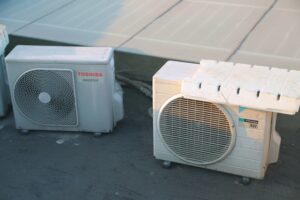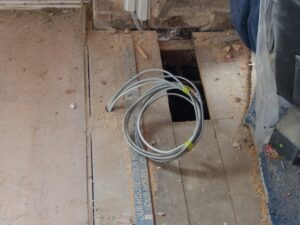Are you tired of running out of hot water or having to wait for the tank to refill? A tankless water heater might be the solution for you. Unlike traditional water heaters, tankless water heaters heat water on demand, providing an endless supply of hot water. Let’s explore how tankless water heaters work and their benefits.
Tankless water heaters work by heating water as it flows through the unit. When you turn on the hot water tap, cold water enters the unit and passes over a heating element or gas burner, quickly raising the water temperature to the desired level. This process eliminates the need for a storage tank, freeing up valuable space in your home or business. Additionally, tankless water heaters are more energy-efficient than traditional water heaters because they only heat water when it is needed, reducing standby energy loss.
Understanding Tankless Water Heaters
Tankless water heaters, also known as on-demand water heaters, are becoming increasingly popular due to their energy efficiency and space-saving design. If you’re considering upgrading your traditional storage tank water heater to a tankless system, here is what you need to know.
The Basics of Tankless Heating
Unlike traditional water heaters that store hot water in a tank, tankless water heaters heat water on demand as it flows through the unit. When you turn on a hot water faucet, cold water flows into the tankless heater, which then heats the water using a heat exchanger. The heated water then flows out of the unit and to your faucet or showerhead.
One of the main advantages of tankless water heaters is that they are more energy-efficient than traditional storage tank water heaters. According to Water Heaters Now, tankless water heaters can provide energy savings of 27 to 50 percent compared to tank-type heaters. This is because they only heat water as it is needed, rather than constantly heating and reheating water in a storage tank.
Another advantage of tankless water heaters is that they take up less space than traditional storage tank water heaters. This makes them a great option for homeowners with limited space.
Comparing Tankless to Traditional Water Heaters
While tankless water heaters have many advantages over traditional water heaters, there are also some drawbacks to consider. For example, tankless water heaters can be more expensive to purchase and install than traditional water heaters. Additionally, they may not be able to provide hot water to multiple fixtures at once, depending on the size of the unit.
Despite these drawbacks, many homeowners are making the switch to tankless water heaters for their energy efficiency and space-saving design. If you’re interested in upgrading to a tankless water heater, contact us at Excel Mechanical for professional HVAC and plumbing services. Our team of professionals strives for exceptional quality and great value, and we work to provide the best possible system to meet your individual needs and budget.
Key Components and Functionality
Tankless water heaters work using advanced technology to provide hot water on demand. These systems are made up of several key components that work together to heat water quickly and efficiently. In this section, we will explore the main components of a tankless water heater and how they function.
Heat Exchanger Technology
The heat exchanger is the heart of a tankless water heater. It is responsible for heating the water as it flows through the system. Tankless water heaters use advanced heat exchanger technology to quickly and efficiently heat water. This technology allows the system to heat water only when it is needed, which makes it much more energy-efficient than traditional water heaters.
Flow Rate and Temperature Control
Flow rate and temperature control are important components of any tankless water heater. These systems are designed to provide hot water on demand, which means that they must be able to adjust the flow rate and temperature of the water as needed. Tankless water heaters use advanced sensors and control systems to monitor the flow rate and temperature of the water, and to adjust the system accordingly.
Energy Sources and Efficiency
Tankless water heaters can be powered by natural gas or electricity, depending on the needs of the user. Gas-powered systems are more energy-efficient than electric systems, but they require a gas line to be installed. Electric systems are more convenient to install, but they are less energy-efficient than gas systems. Regardless of the energy source, tankless water heaters are much more energy-efficient than traditional water heaters. They only heat water when it is needed, which means that they use much less energy than traditional water heaters.
Installation and Maintenance Considerations
Tankless water heaters are a great investment for your home or business. They are more energy-efficient and can save you money in the long run. However, it’s important to consider the installation and maintenance requirements before making a purchase.
Professional Installation Requirements
Tankless water heaters require professional installation by a licensed plumber. We can provide you with professional installation services for both residential and commercial properties. Our team of experts will ensure that your tankless water heater is installed correctly and safely. We work to provide the best possible system to meet individual needs and budget.
Ongoing Maintenance and Care
Like any other appliance, tankless water heaters require ongoing maintenance and care to ensure optimal performance. It’s important to keep your tankless water heater clean and free of debris to prevent mineral buildup and other issues. Regular maintenance can also help extend the lifespan of your tankless water heater.
Dealing with Mineral Buildup
One of the main maintenance concerns with tankless water heaters is mineral buildup. Hard water contains minerals such as calcium and magnesium, which can accumulate in the heat exchanger and reduce efficiency. To prevent this from happening, it’s important to flush your tankless water heater regularly.
It’s important to choose a reliable and professional HVAC and plumbing service provider like us for your tankless water heater installation and maintenance needs. We strive for exceptional quality and great value, and we work to provide the best possible system to meet individual needs and budget. Contact us today to learn more about our services.
Advantages and Limitations
Tankless water heaters offer several advantages over traditional tank-style water heaters. However, they also have some potential limitations and drawbacks to consider.
Energy Savings and Cost Effectiveness
One of the most significant advantages of a tankless water heater is its energy efficiency. Tankless water heaters only heat water when it is needed, which can save energy and reduce utility costs. According to Forbes Home, tankless water heaters can be up to 34% more energy-efficient than traditional tank-style water heaters. Additionally, tankless water heaters typically have a longer lifespan than tank-style water heaters, which can save money on replacement costs over time.
Space Efficiency and Convenience
Another advantage of tankless water heaters is their compact size. Unlike traditional tank-style water heaters, tankless water heaters do not require a large storage tank. This makes them ideal for small spaces or homes where space is at a premium. Additionally, tankless water heaters can provide hot water on demand, which means you will never run out of hot water during a shower or bath. This makes them convenient for households with high hot water demand.
Potential Drawbacks and Considerations
While tankless water heaters offer many benefits, they also have some potential drawbacks to consider. One of the main concerns with tankless water heaters is the risk of misuse. Because they provide hot water on demand, it can be easy to use too much hot water and exceed the unit’s capacity. This can lead to performance issues and potential damage to the unit.
Another consideration is the upfront cost of a tankless water heater. While they can save money on utility bills over time, they can be more expensive to purchase and install than traditional tank-style water heaters. Additionally, not all homes are suitable for tankless water heaters. Homes with low natural gas flow or older electrical systems may not be able to support a tankless water heater.
Overall, tankless water heaters are a great option for homeowners looking to save energy and space. However, it’s important to consider the potential drawbacks and ensure that a tankless water heater is the right choice for your home and hot water needs.
Making the Decision
When considering whether to install a tankless water heater, there are several factors to take into account. One of the main benefits of a tankless water heater is that it is more cost-effective in the long run, as it can save you money on your energy bills. However, the initial cost of installation may be higher than that of a traditional water heater.
It is important to make an informed decision based on your budget and your household’s hot water usage. Consider the life expectancy of the tankless water heater, which is typically longer than that of a traditional water heater. Additionally, tankless water heaters are more efficient in conserving energy and reducing standby heat loss.
We understand that making the decision to install a tankless water heater can be overwhelming. That’s why we offer professional HVAC and plumbing services for both residential and commercial customers. We strive for exceptional quality and great value, working to provide the best possible system to meet your individual needs and budget.
Contact us to discuss your options.




